- Home
- Ian Fleming
Bond 03 - Moonraker Page 3
Bond 03 - Moonraker Read online
Page 3
‘That’s the point,’ said M. ‘Why does he do it? And don’t forget that cheating at cards can still smash a man. In so-called “Society”, it’s about the only crime that can still finish you, whoever you are. Drax does it so well that nobody’s caught him yet. As a matter of fact I doubt if anyone has begun to suspect him except Basildon. He’s the Chairman of Blades. He came to me. He’s got a vague idea I’ve got something to do with Intelligence and I’ve given him a hand over one or two little troubles in the past. Asked my advice. Said he didn’t want a fuss at the club, of course, but above all he wants to save Drax from making a fool of himself. He admires him as much as we all do and he’s terrified of an incident. You couldn’t stop a scandal like that getting out. A lot of M.P.s are members and it would soon get talked about in the Lobby. Then the gossip-writers would get hold of it. Drax would have to resign from Blades and the next thing there’d be a libel action brought in his defence by one of his friends. Tranby Croft all over again. At least, that’s how Basildon’s mind is working and I must say I can see it that way too. Anyway,’ said M. with finality, ‘I’ve agreed to help and,’ he looked levelly at Bond, ‘that’s where you come in. You’re the best card-player in the Service, or,’ he smiled ironically, ‘you should be after the casino jobs you’ve been on, and I remembered that we’d spent quite a lot of money putting you through a course in card-sharping before you went after those Roumanians in Monte Carlo before the war.’
Bond smiled grimly. ‘Steffi Esposito,’ he said softly. ‘That was the chap. American. Made me work ten hours a day for a week learning a thing called the Riffle Stack and how to deal Seconds and Bottoms and Middles. I wrote a long report about it at the time. Must be buried in Records. He knew every trick in the game. How to wax the aces so that the pack will break at them; Edge Work and Line Work with a razor on the backs of the high cards; Trimming; Arm Pressure Holdouts – mechanical gadgets up your sleeve that feed you cards. Belly Strippers – trimming a whole pack less than a millimetre down both sides, but leaving a slight belly on the cards you’re interested in – the aces, for instance. Shiners, tiny mirrors built into rings, or fitted into the bottom of a pipe-bowl. Actually,’ Bond admitted, ‘it was his tip about “Luminous Readers” that helped me on that Monte Carlo job. A croupier was using an invisible ink the team could pick out with special glasses. But Steffi was a wonderful chap. Scotland Yard found him for us. He could shuffle the pack once and then cut the four aces out of it. Absolute magic.’
‘Sounds a bit too professional for our man,’ commented M. ‘That sort of work needs hours of practice every day, or an accomplice, and I can’t believe he’d find that at Blades. No, there’s nothing sensational about his cheating and for all I know it might be a fantastic run of luck. It’s odd. He’s not a particularly good player – he only plays bridge by the way – but quite often he brings off bids or doubles or finesses that are absolutely phenomenal – quite against the odds. Or the conventions. But they come off. He’s always a big winner and they play high at Blades. He hasn’t lost on a weekly settlement since he joined a year ago. We’ve got two or three of the finest players in the world in the club and none of them has ever had a record like that over twelve months. It’s getting talked about in a sort of joking way and I think Basildon’s right to do something about it. What system do you suppose Drax has got?’
Bond was longing for his lunch. The Chief of Staff must have given him up half an hour ago. He could have talked to M. about cheating for hours, and M., who never seemed to be interested in food or sleep, would have listened to everything and remembered it afterwards. But Bond was hungry.
‘Assuming he’s not a professional, sir, and can’t doctor the cards in any way, there are only two answers. He’s either looking, or else he’s got a system of signals with his partner. Does he often play with the same man?’
‘We always cut for partners after each rubber,’ said M. ‘Unless there’s a challenge. And on guest nights, Mondays and Thursdays, you stick to your guest. Drax nearly always brings a man called Meyer, his metal broker. Nice chap. Jew. Very fine player.’
‘I might be able to tell if I watched,’ said Bond.
‘That’s what I was going to say,’ said M. ‘How about coming along tonight? At any rate you’ll get a good dinner. Meet you there about six. I’ll take some money off you at piquet and we’ll watch the bridge for a little. After dinner we’ll have a rubber or two with Drax and his friend. They’re always there on Monday. All right? Sure I’m not taking you away from your work?’
‘No, sir,’ said Bond with a grin. ‘And I’d like to come very much. Bit of a busman’s holiday. And if Drax is cheating, I’ll show him I’ve spotted it and that should be enough to warn him off. I wouldn’t like to see him get into a mess. That all, sir?’
‘Yes, James,’ said M. ‘And thank you for your help. Drax must be a bloody fool. Obviously a bit of a crank. But it isn’t the man I’m worried about. I wouldn’t like to chance anything going wrong with this rocket of his. And Drax more or less is the Moonraker. Well, see you at six. Don’t bother about dressing. Some of us do for dinner and some of us don’t. Tonight we won’t. Better go along now and sandpaper your fingertips or whatever you sharpers do.’
Bond smiled back at M and got to his feet. It sounded a promising evening. As he walked over to the door and let himself out he reflected that here at last was an interview with M. that didn’t cast a shadow.
M.’s secretary was still at her desk. There was a plate of sandwiches and a glass of milk beside her typewriter. She looked sharply at Bond, but there was nothing to be read in his expression.
‘I suppose he gave up,’ said Bond.
‘Nearly an hour ago,’ said Miss Moneypenny reproachfully. ‘It’s half-past two. He’ll be back any minute now.’
‘I’ll go down to the canteen before it closes,’ he said. ‘Tell him I’ll pay for his lunch next time.’ He smiled at her and walked out into the corridor and along to the lift.
There were only a few people left in the officers’ canteen. Bond sat by himself and ate a grilled sole, a large mixed salad with his own dressing laced with mustard, some Brie cheese and toast, and half a carafe of white Bordeaux. He had two cups of black coffee and was back in his office by three. With half his mind preoccupied with M.’s problem, he hurried through the rest of the N.A.T.O. file, said goodbye to his secretary after telling her where he would be that evening, and at four-thirty was collecting his car from the staff garage at the back of the building.
‘Supercharger’s whining a bit, sir,’ said the ex-R.A.F. mechanic who regarded Bond’s Bentley as his own property. ‘Take it down tomorrow if you won’t be needing her at lunch-time.’
‘Thanks,’ said Bond, ‘that’ll be fine.’ He took the car quietly out into the park and over to Baker Street, the two-inch exhaust bubbling fatly in his wake.
He was home in fifteen minutes. He left the car under the plane trees in the little square and let himself into the ground floor flat of the converted Regency house, went into the book-lined sitting-room and, after a moment’s search, pulled Scarne on Cards out of its shelf and dropped it on the ornate Empire desk near the broad window.
He walked through into the smallish bedroom with the white and gold Cole wallpaper and the deep red curtains, undressed and threw his clothes, more or less tidily, on the dark blue counterpane of the double bed. Then he went into the bathroom and had a quick shower. Before leaving the bathroom he examined his face in the glass and decided that he had no intention of sacrificing a lifetime prejudice by shaving twice in one day.
In the glass, the grey-blue eyes looked back at him with the extra light they held when his mind was focused on a problem that interested him. The lean, hard face had a hungry, competitive edge to it. There was something swift and intent in the way he ran his fingers along his jaw and in the impatient stroke of the hairbrush to put back the comma of black hair that fell down an inch above his right eyebrow. It crossed his mind
that, with the fading of his sunburn, the scar down the right cheek that had shown so white was beginning to be less prominent, and automatically he glanced down his naked body and registered that the almost indecent white area left by his bathing trunks was less sharply defined. He smiled at some memory and went through into the bedroom.
Ten minutes later, in a heavy white silk shirt, dark blue trousers of Navy serge, dark blue socks, and well-polished black moccasin shoes, he was sitting at his desk with a pack of cards in one hand and Scarne’s wonderful guide to cheating open in front of him.
For half an hour, as he ran quickly through the section on Methods, he practised the vital Mechanic’s Grip (three fingers curled round the long edge of the cards, and the index finger at the short upper edge away from him), Palming and Nullifying the Cut. His hands worked automatically at these basic manoeuvres while his eyes read, and he was glad to find that his fingers were supple and assured and that there was no noise from the cards even with the very difficult single-handed Annulment.
At five-thirty he slapped the cards on the table and shut the book.
He went into his bedroom, filled the wide black case with cigarettes and slipped it into his hip pocket, put on a black knitted silk tie and his coat and verified that his cheque book was in his notecase.
He stood for a moment, thinking. Then he selected two white silk handkerchiefs, carefully rumpled them, and put one into each side-pocket of his coat.
He lit a cigarette and walked back into the sitting-room and sat down at his desk again and relaxed for ten minutes, gazing out of the window at the empty square and thinking about the evening that was just going to begin and about Blades, probably the most famous private card club in the world.
The exact date of the foundation of Blades is uncertain. The second half of the eighteenth century saw the opening of many coffee houses and gaming rooms, and premises and proprietors shifted often with changing fashions and fortunes. White’s was founded in 1755, Almack’s in 1764, and Brooks’s in 1774, and it was in that year that the Scavoir Vivre, which was to be the cradle of Blades, opened its doors on to Park Street, a quiet backwater off St. James’s.
The Scavoir Vivre was too exclusive to live and it blackballed itself to death within a year. Then, in 1776, Horace Walpole wrote: ‘A new club is opened off St. James’s Street that piques itself in surpassing all its predecessors’ and in 1778 ‘Blades’ first occurs in a letter from Gibbon, the historian, who coupled it with the name of its founder, a German called Longchamp at that time conducting the Jockey Club at Newmarket.
From the outset Blades seems to have been a success, and in 1782 we find the Duke of Wirtemberg writing excitedly home to his younger brother: ‘This is indeed the “Ace of Clubs”! There have been four or five quinze tables going in the room at the same time, with whist and piquet, after which a full Hazard table. I have known two at the same time. Two chests each containing 4,000 guinea rouleaus were scarce sufficient for the night’s circulation.’
Mention of Hazard perhaps provides a clue to the club’s prosperity. Permission to play this dangerous but popular game must have been given by the Committee in contravention of its own rules which laid down that ‘No game is to be admitted to the House of the Society but Chess, Whist, Picket, Cribbage, Quadrille, Ombre and Tredville’.
In any event the club continued to flourish and remains to this day the home of some of the highest ‘polite’ gambling in the world. It is not as aristocratic as it was, the redistribution of wealth has seen to that, but it is still the most exclusive club in London. The membership is restricted to two hundred and each candidate must have two qualifications for election; he must behave like a gentleman and he must be able to ‘show’ £100,000 in cash or gilt-edged securities.
The amenities of Blades, apart from the gambling, are so desirable that the Committee has had to rule that every member is required to win or lose £500 a year on the club premises, or pay an annual fine of £250. The food and wine are the best in London and no bills are presented, the cost of all meals being deducted at the end of each week pro rata from the profits of the winners. Seeing that about £5,000 changes hands each week at the tables the impost is not too painful and the losers have the satisfaction of saving something from the wreck; and the custom explains the fairness of the levy on infrequent gamblers.
Club servants are the making or breaking of any club and the servants of Blades have no equal. The half-dozen waitresses in the dining-room are of such a high standard of beauty that some of the younger members have been known to smuggle them undetected into débutante balls, and if, at night, one or other of the girls is persuaded to stray into one of the twelve members’ bedrooms at the back of the club, that is regarded as the member’s private concern.
There are one or two other small refinements which contribute to the luxury of the place. Only brand-new currency notes and silver are paid out on the premises and, if a member is staying overnight, his notes and small change are taken away by the valet who brings the early morning tea and The Times and are replaced with new money. No newspaper comes to the reading room before it has been ironed. Floris provides the soaps and lotions in the lavatories and bedrooms; there is a direct wire to Ladbroke’s from the porter’s lodge; the club has the finest tents and boxes at the principal race-meetings, at Lord’s, Henley, and Wimbledon, and members travelling abroad have automatic membership of the leading club in every foreign capital.
In short, membership of Blades, in return for the £100 entrance fee and the £50 a year subscription, provides the standard of luxury of the Victorian age together with the opportunity to win or lose, in great comfort, anything up to £20,000 a year.
Bond, reflecting on all this, decided that he was going to enjoy his evening. He had only played at Blades a dozen times in his life, and on the last occasion he had burnt his fingers badly in a high poker game, but the prospect of some expensive bridge and of the swing of a few, to him, not unimportant hundred pounds made his muscles taut with anticipation.
And then, of course, there was the little business of Sir Hugo Drax, which might bring an additional touch of drama to the evening.
He was not even disturbed by a curious portent he encountered while he was driving along King’s Road into Sloane Square with half his mind on the traffic and the other half exploring the evening ahead.
It was a few minutes to six and there was thunder about. The sky threatened rain and it had become suddenly dark. Across the square from him, high up in the air, a bold electric sign started to flash on and off. The fading light-waves had caused the cathode tube to start the mechanism which would keep the sign flashing through the dark hours until, around six in the morning, the early light of day would again sensitize the tube and cause the circuit to close.
Startled at the great crimson words, Bond pulled in to the curb, got out of the car and crossed to the other side of the street to get a better view of the big skysign.
Ah! That was it. Some of the letters had been hidden by a neighbouring building. It was only one of those Shell advertisements. ‘SUMMER SHELL IS HERE’ was what it said.
Bond smiled to himself and walked back to his car and drove on.
When he had first seen the sign, half-hidden by the building, great crimson letters across the evening sky had flashed a different message.
They had said: ‘HELL IS HERE … HELL IS HERE … HELL IS HERE.’
4 ....... THE ‘SHINER’
BOND LEFT the Bentley outside Brooks’s and walked round the corner into Park Street.
The Adam frontage of Blades, recessed a yard or so back from its neighbours, was elegant in the soft dusk. The dark red curtains had been drawn across the ground floor bow windows on either side of the entrance and a uniformed servant showed for a moment as he drew them across the three windows of the floor above. In the centre of the three, Bond could see the heads and shoulders of two men bent over a game, probably backgammon he thought, and he caught a glimpse of the spangled fir
e of one of the three great chandeliers that illuminate the famous gambling room.
Bond pushed through the swing doors and walked up to the old-fashioned porter’s lodge ruled over by Brevett, the guardian of Blades and the counsellor and family friend of half the members.
‘Evening, Brevett. Is the Admiral in?’
‘Good evening, sir,’ said Brevett, who knew Bond as an occasional guest at the club. ‘The Admiral’s waiting for you in the card room. Page, take Commander Bond up to the Admiral.
Lively now!’
As Bond followed the uniformed page boy across the worn black and white marble floor of the hall and up the wide staircase with its fine mahogany balustrade, he remembered the story of how, at one election, nine blackballs had been found in the box when there were only eight members of the Committee present. Brevett, who had handed the box from member to member, was said to have confessed to the Chairman that he was so afraid the candidate would be elected that he had put in a blackball himself. No one had objected. The Committee would rather have lost its chairman than the porter whose family had held the same post at Blades for a hundred years.
The page pushed open one wing of the tall doors at the top of the stairs and held it for Bond to go through. The long room was not crowded and Bond saw M. sitting by himself playing patience in the alcove formed by the left hand of the three bow windows. He dismissed the page and walked across the heavy carpet, noticing the rich background smell of cigar-smoke, the quiet voices that came from the three tables of bridge, and the sharp rattle of dice across an unseen backgammon board.
‘There you are,’ said M. as Bond came up. He waved to the chair that faced him across the card table. ‘Just let me finish this. I haven’t cracked this man Canfield for months. Drink?’
‘No, thanks,’ said Bond. He sat down and lit a cigarette and watched with amusement the concentration M. was putting into his game.

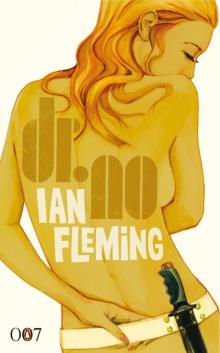 Doctor No
Doctor No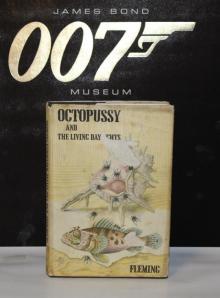 Octopussy & the Living Daylights
Octopussy & the Living Daylights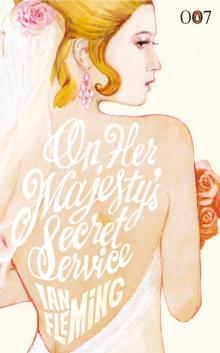 On Her Majestys Secret Service
On Her Majestys Secret Service You Only Live Twice
You Only Live Twice From Russia With Love
From Russia With Love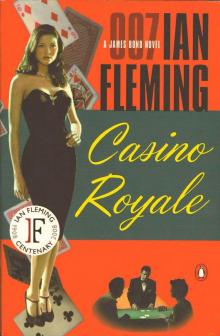 Casino Royale
Casino Royale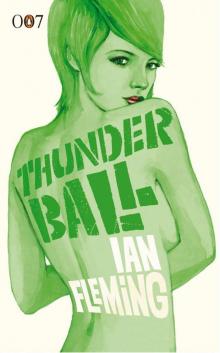 Thunderball
Thunderball For Your Eyes Only
For Your Eyes Only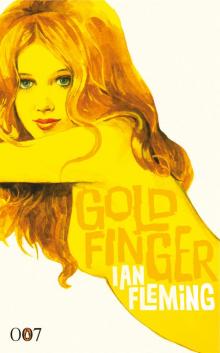 Goldfinger
Goldfinger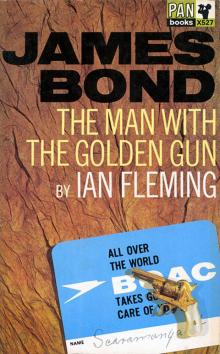 The Man With the Golden Gun
The Man With the Golden Gun The Spy Who Loved Me
The Spy Who Loved Me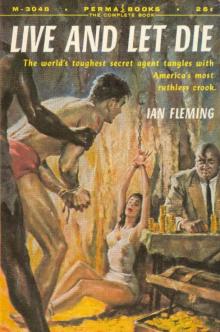 Live and Let Die
Live and Let Die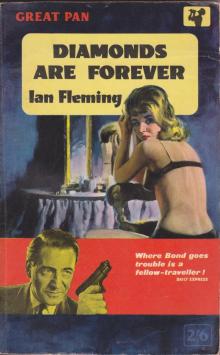 Diamonds Are Forever
Diamonds Are Forever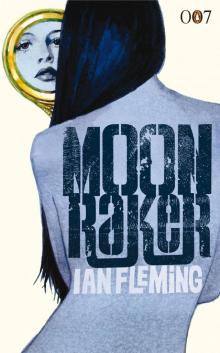 Moonraker
Moonraker The James Bond MEGAPACK®
The James Bond MEGAPACK®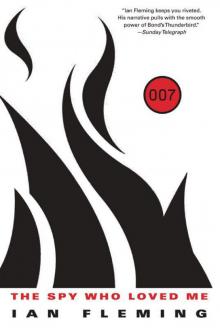 Bond 10 - The Spy Who Loved Me
Bond 10 - The Spy Who Loved Me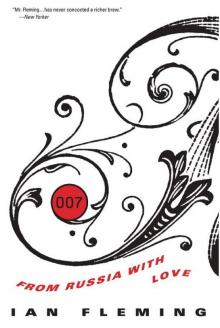 From Russia with Love (James Bond - Extended Series Book 5)
From Russia with Love (James Bond - Extended Series Book 5)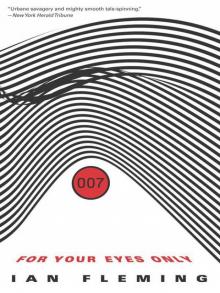 Bond 08 - For Your Eyes Only
Bond 08 - For Your Eyes Only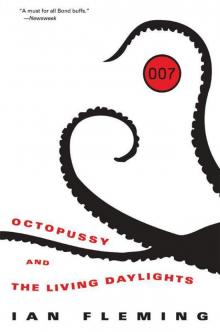 Bond 14 - Octopussy and the Living Daylights
Bond 14 - Octopussy and the Living Daylights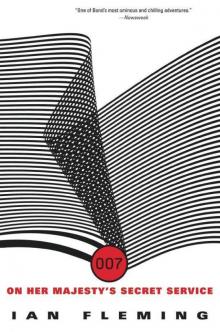 Bond 11 - On Her Majesty's Secret Service
Bond 11 - On Her Majesty's Secret Service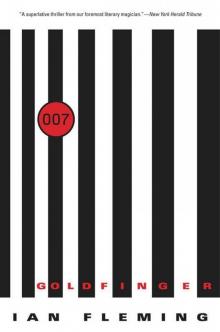 Bond 07 - Goldfinger
Bond 07 - Goldfinger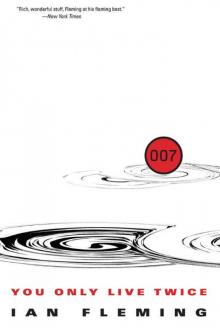 Bond 12 - You Only Live Twice
Bond 12 - You Only Live Twice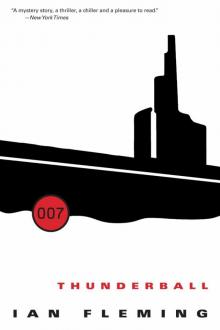 Bond 09 - Thunderball
Bond 09 - Thunderball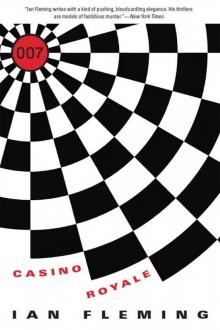 Bond 01 - Casino Royale
Bond 01 - Casino Royale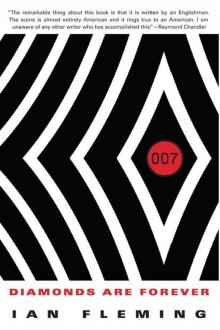 Diamonds are Forever (James Bond - Extended Series Book 4)
Diamonds are Forever (James Bond - Extended Series Book 4)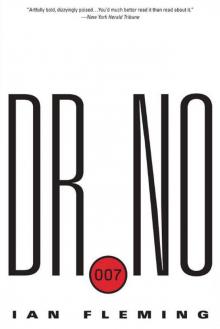 Bond 06 - Dr. No
Bond 06 - Dr. No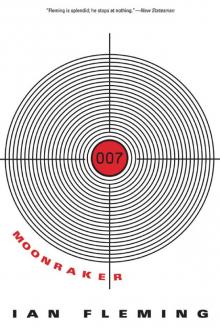 Moonraker (James Bond - Extended Series Book 3)
Moonraker (James Bond - Extended Series Book 3)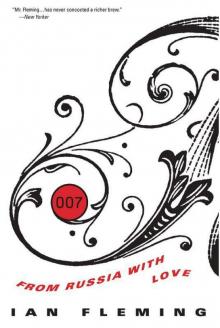 Bond 05 - From Russia With Love
Bond 05 - From Russia With Love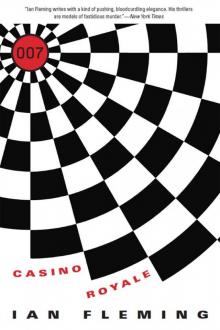 Casino Royale (James Bond - Extended Series Book 1)
Casino Royale (James Bond - Extended Series Book 1)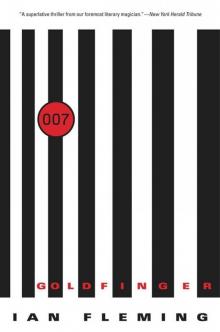 Goldfinger (James Bond - Extended Series Book 7)
Goldfinger (James Bond - Extended Series Book 7) Chitty Chitty Bang Bang: The Magical Car
Chitty Chitty Bang Bang: The Magical Car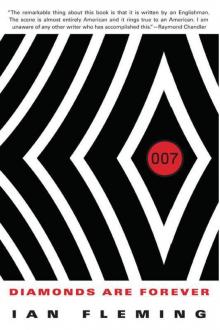 Bond 04 - Diamonds Are Forever
Bond 04 - Diamonds Are Forever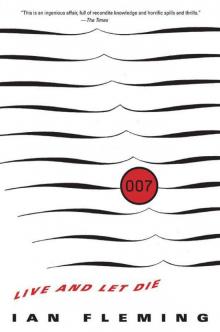 Bond 02 - Live and Let Die
Bond 02 - Live and Let Die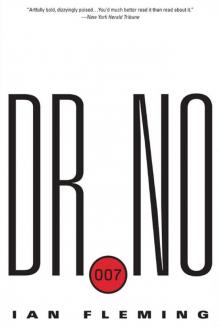 Dr. No (James Bond - Extended Series Book 6)
Dr. No (James Bond - Extended Series Book 6) The Hildebrandt rarity
The Hildebrandt rarity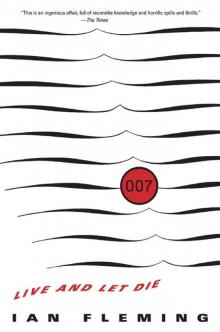 Live and Let Die (James Bond - Extended Series Book 2)
Live and Let Die (James Bond - Extended Series Book 2) Chitty Chitty Bang Bang
Chitty Chitty Bang Bang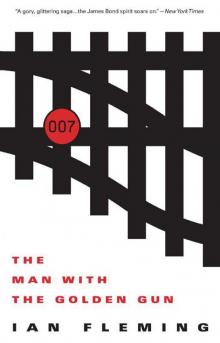 Bond 13 - The Man With the Golden Gun
Bond 13 - The Man With the Golden Gun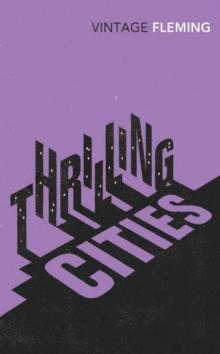 Thrilling Cities
Thrilling Cities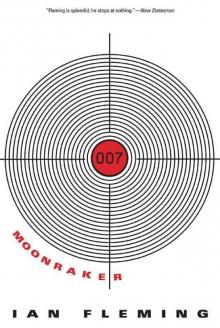 Bond 03 - Moonraker
Bond 03 - Moonraker